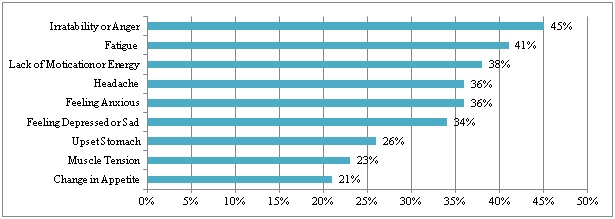You’ve got to put on your detective hat to discover your stress symptoms because they could be virtually anything. The way your body expresses stress will be as unique as you are. Basically, anything out of the ordinary could be linked to stress.
If you are under stress and suspect that it has begun to impact the normal functioning of your body, take a moment to investigate. Sit in a comfy chair or lie down and scan your body. Starting at your toes, bring your awareness there. Take note of anything that feels off. Are you tense? Itchy? Soar? Upset?
Continue with this exercise scanning your legs, abdomen, torso, arms, back, neck and head. Take your time being slow and methodical. Don’t judge yourself for how you feel, just be curious about what your body is communicating.
I tend to hold stress in my face and neck. My face scrunches up as if I’m concentrating when there is nothing to concentrate on. My neck will become tense, and I’ll feel tight nerve sensation down my right arm. It took me a while to notice what was going on with my face, and I was surprised at how often my brow is furrowed as if I’m continually perplexed by life.
In addition to physical signs of stress, there are also ways that stress impacts our thoughts and emotions. Once you have scanned your body, with your eyes closed, shift your focus to your inner world. Do you feel crabby? Overwhelmed? Confused? Able to make decisions? Are your thoughts scattered? Do you daydream? Is it hard to focus?
Stress has become a fairly routine part of life. Most people can continue on functioning normally with large amounts of stress. We may not even be aware of how stressed we are. In some sense, only by watching the body, mind and emotions can we know when something is off.
While there is no one answer to what your unique stress symptoms will be, here is an exhaustive list of things that can be related to stress.
(Note that if you have any of these symptoms it does not mean they are absolutely attributable to stress.)
Physical Symptoms
- Upset Stomach
- Diarrhea
- Constipation
- Other GI Problems
- Heartburn
- Urinary Tract Infection
- Yeast Infection
- Frequent and/or lingering cold or flu
- Fatigue
- Shortness of Breath
- Rapid Heartbeat
- Increased Blood Pressure
- Headache
- Muscle tension and/or pain
- Neuropathy
- Chest Pain
- Change in Sex Drive and/or sexual ability
- Disrupted sleep patterns
- Rash
- Feeling weak and/or achy
- Severe allergies
- Eye twitch
- Nervousness
- Sweaty palms and/or feet
- Ringing in the ear
- Teeth grinding and/or tight jaw
- Dry mouth
- Changes in appetite
- Reduced fertility and/or changes in menstrual cycle
- Excessive weight gain or loss
- Stuttering
- Neck and/or back pain and tension
- Dizziness
- Blushing
- Herpes sores or cold sores
- Hives
- Excessive belching or flatulence
- Incontinence
- Frequent Urination
Mental & Emotional Symptoms
- Irritability
- In ability to concentrate
- Increased use of cigarettes, alcohol or drugs
- Craving high calorie foods
- Lack of motivation
- Using more over-the-counter medications
- Problems putting thoughts together
- Isolation
- Reduced productivity
- Things take longer than normal
- Making small errors in work
- Feeling anxious
- Worry
- Feeling worthless
- More frequent crying
- Decreased interest in appearance
- Always running late
- Feeling overwhelmed
- Wanting to escape/leave
- Making decisions is difficult
- Racing thoughts
- Disorganization
- Forgetfulness
- Shorter fuse
- Feeling ‘on edge’
- Restlessness
Please be sure to see a doctor about any physical symptoms that are concerning, especially shortness of breath, chest pain, GI problems and lingering illnesses. If your emotions or thoughts become overwhelming, please seek the services of a mental health professional.
Want to know what other people are coping with? Here’s are the most common symptoms of stress:
Experiencing any of these? If so, check out my other articles on working through stress.
What are your favorite ways to relieve stress?


